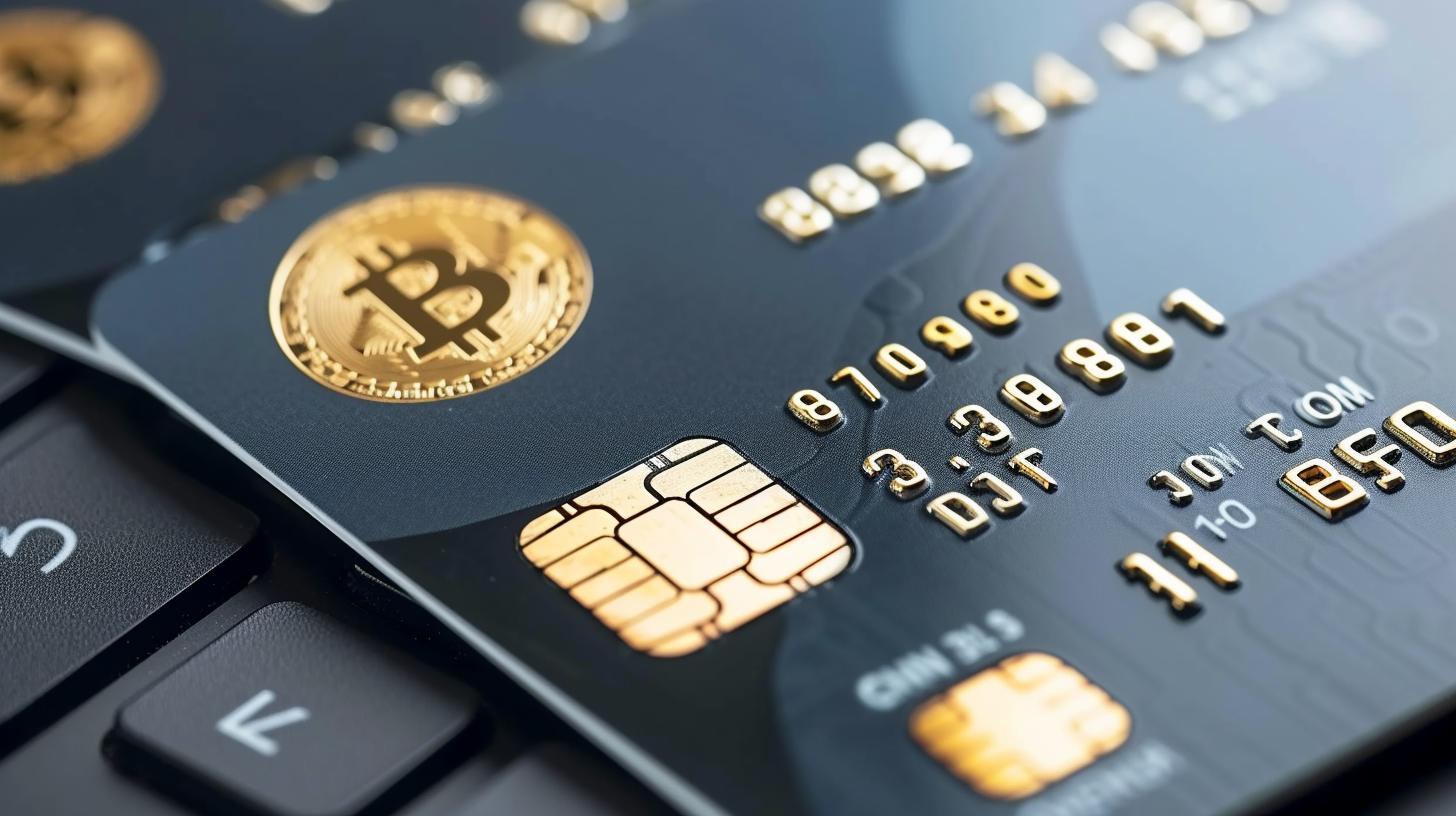
Are you interested in using cryptocurrencies for your daily transactions? If so, a crypto debit card might be the perfect solution for you. In this article, we will provide a detailed introduction to crypto debit cards, explaining what they are and how they work, as well as the benefits of using them for everyday purchases.
Crypto debit cards are a convenient and efficient way to spend your cryptocurrencies in the real world. These cards function similarly to traditional debit cards, allowing users to make purchases at physical and online stores, withdraw cash from ATMs, and even pay bills using their cryptocurrency holdings. By providing easy access to funds stored in digital wallets, crypto debit cards bridge the gap between the digital and physical economies.
One of the main benefits of using crypto debit cards is the ability to seamlessly integrate cryptocurrency into your daily life. Instead of relying solely on traditional fiat currencies, you can now use your crypto assets for various expenses such as groceries, dining out, or even travel bookings. Additionally, crypto debit cards offer enhanced privacy and security features compared to conventional payment methods, making them an attractive option for many individuals seeking greater control over their financial transactions.
Comparison of Top Crypto Debit Cards
When it comes to choosing a crypto debit card, there are several options available in the market, each with its own set of features, fees, and supported cryptocurrencies. To help you make an informed decision, here is a detailed comparison of some of the top crypto debit cards currently available:
- Crypto.com Visa Card: Crypto.com offers a range of Visa cards that support various cryptocurrencies such as Bitcoin, Ethereum, and Litecoin. The cards come with different benefits and perks based on the staking requirements and offer cashback rewards on every purchase. However, users should be aware of the potential fees for card issuance, ATM withdrawals, and foreign transactions.
- Coinbase Card: Coinbase provides a Visa debit card that allows users to spend their cryptocurrency holdings directly from their Coinbase account. The card supports multiple cryptocurrencies and offers real-time reward earnings in cryptocurrency for every transaction. Users should consider the fees associated with card issuance, domestic and international ATM withdrawals, as well as the spending limits.
- BitPay Card: BitPay offers a Mastercard prepaid card that enables users to convert their cryptocurrency into fiat currency for everyday purchases. The card supports Bitcoin and Bitcoin Cash, providing flexibility for spending at merchants worldwide. However, users should take note of the card activation fee and inactivity fee that may apply.
These are just a few examples from the list of crypto debit cards available in the market. Each card has its own unique features and benefits, so it’s important to consider your specific needs and preferences when choosing the right one for you. Whether you prioritize low fees, wide cryptocurrency support or additional perks such as cashback rewards, conducting thorough research on the available options will help you make an informed decision that aligns with your financial goals.
In addition to considering the fees associated with each card, it’s also important to evaluate the usability of these crypto debit cards in various scenarios such as online purchases, in-store transactions, and international travel. By comparing these factors along with security features and customer support services offered by the card providers, you can select a crypto debit card that best suits your lifestyle and financial habits.
Overall, while there are many choices when it comes to crypto debit cards in today’s market, understanding their differences in terms of fees, supported cryptocurrencies, usability will help you choose one that aligns with your individual needs. With thorough research and consideration of these factors highlighted above will ensure that you select a crypto debit card that aligns well with your lifestyle requirements while offering security measures for transactions involving digital assets.
Security Features of Crypto Debit Cards
When it comes to using crypto debit cards, security is a top priority for users. Fortunately, most crypto debit cards come with a range of security features and measures to protect users’ funds and personal information. These security measures are essential in ensuring that users can use their crypto debit cards with confidence and peace of mind.
Here are some of the common security features offered by crypto debit cards:
- Two-Factor Authentication (2FA): Many crypto debit card providers offer 2FA as an additional layer of security when logging in or making transactions. This can include SMS verification, biometric authentication, or authenticator apps.
- Encryption: The sensitive data stored on the crypto debit card, such as private keys and account information, are often encrypted to prevent unauthorized access.
- Fraud Monitoring: Crypto debit card providers often have sophisticated fraud monitoring systems in place to detect and prevent fraudulent transactions in real-time.
- Wallet Freezing: In case of a lost or stolen card, many providers offer the ability to freeze the associated wallet instantly through their mobile app or website.
These security features give users a high level of protection against unauthorized access and fraudulent activities. Additionally, many reputable crypto debit card providers comply with industry-standard security practices and regulations to ensure the safety and integrity of their services.
It’s important for users to carefully review the security features offered by different crypto debit cards when choosing the right option for their needs. By prioritizing security, users can confidently use their crypto debit cards for everyday transactions without compromising the safety of their funds and personal information.
How to Get a Crypto Debit Card
A crypto debit card is a digital payment card that allows users to make transactions using their cryptocurrency holdings. These cards are becoming increasingly popular as they offer a convenient way to use digital assets for everyday purchases. In this section, we will provide a step-by-step guide on how to obtain a crypto debit card, including the application process and verification requirements.
1. Research and Choose a Provider: The first step in getting a crypto debit card is to research and choose a provider that offers the features and benefits you are looking for. There are various providers in the market, each with its own set of supported cryptocurrencies, fees, and usability. Consider factors such as fees, supported cryptocurrencies, security features, and global availability when choosing a provider.
2. Sign Up and Verify Your Identity: Once you have chosen a provider, you will need to sign up for an account on their platform. During the registration process, you will be required to verify your identity in compliance with Know Your Customer (KYC) regulations. This typically involves providing personal information such as your full name, address, date of birth, and government-issued identification.
3. Fund Your Account: After successfully verifying your identity, you will need to fund your account with the desired amount of cryptocurrency or fiat currency. Some providers may also require an initial deposit or minimum balance to activate the card.
4. Order Your Card: Once your account is funded, you can proceed to order your crypto debit card through the provider’s website or mobile app. The card will be shipped to your registered address within a specified period of time.

As the demand for crypto debit cards continues to grow rapidly, more providers are entering the market with innovative offerings. When considering which crypto debit card is right for you among the list of crypto debit cards available in the market, it’s important not only consider functionality but also weigh any restrictions or limitations before making a decision.
| Provider | Supported Cryptocurrencies | Fees | Verification Requirements |
|---|---|---|---|
| Provider A | Bitcoin (BTC), Ethereum (ETH), Litecoin (LTC) | No issuance fee; 1% foreign transaction fee | ID verification; proof of address |
| Provider B | Bitcoin (BTC) only | $10 issuance fee; no foreign transaction fee | ID verification only |
It is crucial for individuals interested in obtaining a crypto debit card to align their needs with what each respective company has to offer.Transporting over funds beyond those needed for daily spending raise security concerns that must alternatively be calculated.Conclusively having more than one physical or virtual option allows users greater flexibility in leveraging diverse currencies based off unique demands.
Using Crypto Debit Cards for Everyday Expenses
Crypto debit cards have become increasingly popular as a payment method for everyday expenses such as shopping, dining, and bill payments. These cards allow users to spend their cryptocurrency holdings at traditional and online retailers that may not accept digital currency directly. This convenience has made crypto debit cards a valuable tool for individuals looking to seamlessly integrate their cryptocurrency wealth into their daily lives.
One of the main advantages of using a crypto debit card for everyday expenses is the ability to diversify spending options. By linking the card to a cryptocurrency wallet, users can access their digital assets to make purchases in the same way they would with a traditional debit or credit card. Additionally, some crypto debit cards offer rewards programs and cashback incentives, providing additional benefits for using them for daily transactions.
As with any financial tool, there are considerations to keep in mind when using a crypto debit card for everyday expenses. It’s important to be aware of fees associated with transactions and account maintenance, as well as any potential limitations on spending or withdrawals. Understanding these factors will help users make informed decisions about when and where to use their crypto debit card.
In addition, users should also remain vigilant about the security of their crypto debit card information and take necessary precautions to protect against fraud or unauthorized access. While many crypto debit cards offer advanced security features such as two-factor authentication and real-time transaction monitoring, it’s crucial for users to be proactive in safeguarding their funds and personal data when using these cards.
By doing so, individuals can confidently incorporate their crypto debit card into their daily financial activities while minimizing potential risks.
| Advantages | Considerations |
|---|---|
| Ability to diversify spending options | Awareness of fees and limitations |
| Rewards programs and cashback incentives | Vigilance about security measures |
Fees and Limitations
Cryptocurrency debit cards have gained popularity as a convenient and practical way for crypto users to spend their digital assets in the real world. However, like traditional debit cards, crypto debit cards come with various fees, limitations, and potential drawbacks that users should be aware of before choosing one. This section will discuss the key considerations related to fees and limitations associated with using crypto debit cards.

Fees Associated With Crypto Debit Cards
When it comes to using crypto debit cards, users should be mindful of the different types of fees that may apply. These typically include issuance fees, monthly or annual maintenance fees, transaction fees, ATM withdrawal fees, currency conversion fees for international transactions, and inactivity fees. It’s important for users to carefully review the fee structure of each card to understand the total cost of ownership before making a decision.
Limitations and Drawbacks
In addition to fees, there are certain limitations and potential drawbacks that come with using crypto debit cards. One common limitation is withdrawal limits, which can restrict the amount of cryptocurrency or fiat currency that can be withdrawn from ATMs on a daily or monthly basis.
Furthermore, some cards may have restrictions on the maximum transaction amount or impose additional charges for transactions above a certain threshold. Users should also consider any potential drawbacks such as network downtime or limited merchant acceptance when evaluating their options.
Foreign Transaction Fees
For individuals who travel frequently or make purchases in foreign currencies, it’s important to factor in foreign transaction fees when choosing a crypto debit card. These fees can significantly impact the overall cost of using the card abroad and may vary depending on the provider. Therefore, users should compare foreign transaction fees among different cards to find one that offers competitive rates for international spending.
Ultimately, understanding the various fees, limitations, and potential drawbacks associated with using crypto debit cards is crucial for making informed decisions. By carefully evaluating these factors alongside other considerations such as supported cryptocurrencies and usability, individuals can choose a card that aligns with their financial needs and usage preferences within today’s list of crypto debit cards available in the market.
Future of Crypto Debit Cards
The future of crypto debit cards holds exciting potential for advancements and innovations in the industry. As the crypto market continues to evolve, it is expected that crypto debit cards will also undergo significant developments to meet the growing needs of users. This section will explore the potential trends and advancements that can be anticipated in the realm of crypto debit cards.
Integration With Decentralized Finance (DeFi)
One emerging trend in the future of crypto debit cards is their integration with decentralized finance (DeFi) protocols. DeFi platforms are gaining popularity for offering a wide range of financial services without the need for traditional intermediaries. By integrating with DeFi, crypto debit cards could provide users with access to decentralized lending, borrowing, and savings protocols, allowing for more comprehensive financial management directly from their card accounts.
Enhanced Security Measures
Security is always a top priority when it comes to financial products, and the future of crypto debit cards will likely see enhanced security measures to protect users’ funds and personal information. This may include advanced biometric authentication methods, multi-signature transactions, and real-time fraud detection capabilities. By leveraging cutting-edge security technologies, crypto debit cards can offer unmatched protection against unauthorized access and fraudulent activities.
Wider Acceptance and Integration
As cryptocurrencies gain mainstream acceptance, the future of crypto debit cards will involve wider acceptance and integration with various merchants and payment providers worldwide. This expansion would enable users to seamlessly use their crypto debit cards for everyday expenses at retail stores, online shops, restaurants, and other establishments. Furthermore, there may be increased integration with digital wallet providers and payment processing networks to facilitate cross-border transactions more efficiently.
Overall, the future of crypto debit cards holds promise for transformative changes that will further enhance their usability, security, and acceptance in the global market. With advancements such as DeFi integration, enhanced security measures, and wider acceptance on the horizon, crypto debit cards are poised to become an integral part of everyday financial transactions for both cryptocurrency enthusiasts.
Tips for Choosing the Right Crypto Debit Card
In conclusion, the popularity of crypto debit cards continues to rise as more individuals seek convenient ways to access and utilize their digital assets for everyday transactions. As evident from the comparison of the top crypto debit cards, there are various options available in the market, each with its own set of features, fees, and supported cryptocurrencies.
With the growing list of crypto debit cards, it is essential for users to carefully consider their needs and preferences before choosing the right card that aligns with their financial goals and spending habits.
When selecting a crypto debit card, users should prioritize security features to protect their funds and personal information. It is also important to assess the fees associated with each card, including withdrawal limits and foreign transaction fees. Furthermore, considering the practical uses of the card for everyday expenses such as shopping, dining, and bill payments can help users determine which card provides the most value for their specific lifestyle.
Looking ahead, the future of crypto debit cards appears promising as advancements in technology may lead to improved usability and broader acceptance. As more individuals embrace digital currencies as a form of payment, it is likely that the demand for crypto debit cards will continue to grow. Ultimately, by staying informed about current offerings and future developments in the industry, users can make informed decisions when choosing a crypto debit card that best meets their financial needs.






